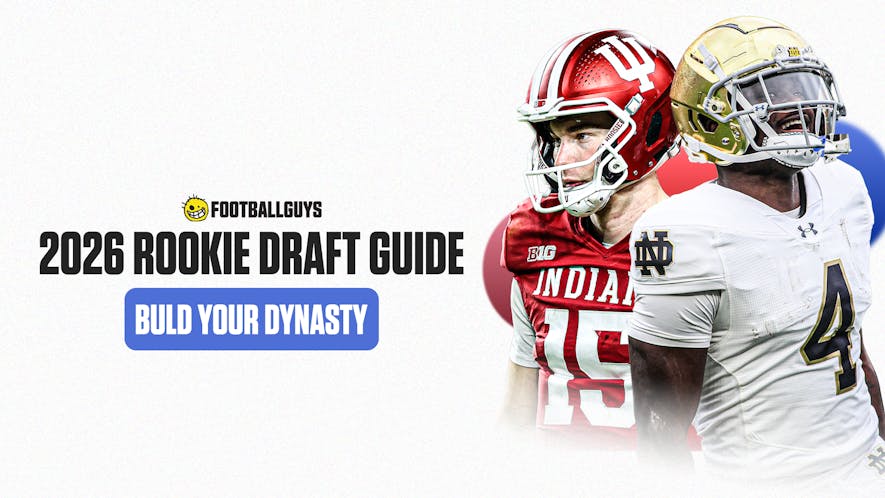There's a lot of really strong dynasty analysis out there, especially when compared to five or ten years ago. But most of it is so dang practical-- Player X is undervalued, Player Y's workload is troubling, the market at this position is irrational, take this specific action to win your league. Dynasty, in Theory is meant as a corrective, offering insights and takeaways into the strategic and structural nature of the game that might not lead to an immediate benefit, but which should help us become better players over time. (Additionally, it serves as a vehicle for me to make jokes like "theoretically, this column will help you out".)
Managing Your Imaginary Imaginary Football Teams
For the last two weeks we've discussed paradigms, ways of looking at things that don't change the underlying nature of reality (but might change how we respond to that reality). We'll return to the subject soon because I have several more paradigms that I find useful, but this week I want to change gears, inspired by a brief conversation I recently had with a friend of mine.
I am begging you not to trade a 1st for Christian Kirk pic.twitter.com/f1TpCo9BIy
— Cooper Adams (@CoopsFB) September 28, 2022
Counterpoint: Christian Kirk (25 years old) ranks 13th in FBGs’ rest-of-season rankings, ahead of Tee Higgins, CeeDee Lamb, Diontae Johnson, DeVonta Smith, DK Metcalf, Marquise Brown, Rashad Bateman, and many others.
— Adam Harstad (@AdamHarstad) September 29, 2022
Three spots behind ARSB.
I think the best reason not to trade a 1st for Kirk is simply that you probably don’t have to.
— Adam Harstad (@AdamHarstad) September 29, 2022
Even if you really buy the profile you could probably get 20-30% exposure with 2nds alone. “Don’t buy dudes where they’re most expensive” is just Dynasty 101.
I want to be clear up front that this isn't an exhortation to trade for Christian Kirk; remember, this isn't that kind of column. I was largely playing devil's advocate to Cooper, pointing out the well-established link between redraft production this year and dynasty value next year. (I'll be writing a lot more about that link in coming weeks.) But the last tweet is the one to focus on here.
Cooper is what is known as a "high-volume" dynasty manager. At last count he has 21 different dynasty teams, and he manages them like an investment portfolio. In theory, if players were randomly distributed, he would expect to have every player on 1/12th of his rosters. Instead, if he thinks a player is overpriced, he'll sell that player until he has a lower rostered percentage, and if he thinks a player is underpriced he'll trade for that player until he has a higher rostered percentage.
But, because he's managing his 21 teams as a portfolio, the question becomes less whether to trade those players and more where to trade those players. And the answer is "wherever they're cheapest". Let's say that Cooper believed Kirk was worth not just any 2023 first, but a high one. That doesn't mean he should go out and trade all of his high 2023 firsts until he has Christian Kirk on all 21 teams. Instead, he should start buying Kirk in whatever leagues Kirk is cheapest to acquire, which means starting with offers of a rookie 2nd-round pick.
High-volume managers think in terms of something called "exposure", or what percent of rosters a player is on (and therefore how "exposed" they are to risk). Again, neutral exposure is 1/12th, or 8.3%. That's how many rosters a player would be on if you were neither seeking them out nor avoiding them, if chance alone dictated your team.
Heavy exposure is anything over that. How heavy you want the exposure to be is a function of how wrong you think the market is. At the most extreme, if I believed a player was the best in the league and the market had him worth a rookie 4th round pick, I would expect to get near 100% "exposure" to that player. If I thought a player was worth a late 1st and the market thought he was worth an early 2nd, I might stop at 17-25% exposure.
This should be fairly self-evident. If you're going to buy Kirk on ten teams, it's better to have ten teams with Christian Kirk and a 1st (because they traded away their 2nd) than to have ten teams with Christian Kirk and a 2nd (because they traded away their 1st). The cheaper you acquire a player, the higher the margin of error becomes-- the more room you have to be wrong in your evaluation and still turn a profit on the trade.
Continue reading this content with a ELITE subscription.
An ELITE subscription is required to access content for Dynasty leagues. If this league is not a Dynasty league, you can edit your leagues here.

